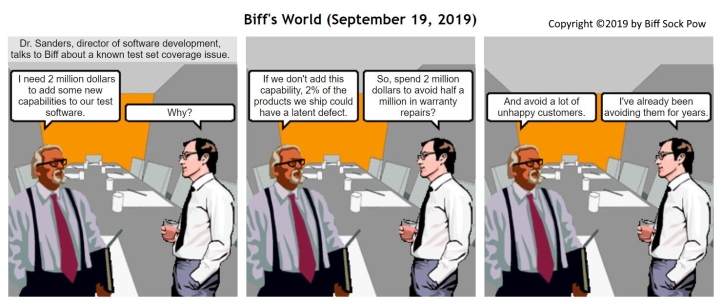
One of the unfortunate things I’ve learned in all my decades in the corporate world is that the phrase “return on investment” (ROI) can have some rather unpleasant outcomes. It can muddy the waters in decisions that involve “doing the right thing”.
Can one put a price on doing the right thing?
You betcha!
Companies do it all the time. Companies literally weigh the cost of doing the right thing against the cost of doing nothing.
Doing nothing often wins.
Why?
Because it has a better ROI.
Being proactive is expensive.
⇐PREVIOUS
NEXT⇒


I’ve heard this called “the Fight Club formula”. It’s a shame when profit is more important than people.
LikeLiked by 1 person
That’s a great name for it!
LikeLiked by 1 person
This is an interesting area. If a company doesn’t fix the possible problem and a customer is injured — at least in the USA where settlements are astronomical — the lawsuit can be $2-5 million.
This is why it’s great to have stuff made overseas, where no one can hold the manufacturer accountable. However, if it’s made for a North American company, then you’re back to the lawsuit.
I suspect in time all manufactured goods that could possibly hurt someone will be imported directly from Ming-ling-Chu, just to end ridiculous law suits.
LikeLiked by 1 person
Yes, those all play into the calculus of deciding whether or not to fix a problem. Sometimes repair-or-replace, even factoring in potential lawsuits, is a much cheaper option. Recalls are, by far, the most expensive option.
Companies must also factor in intangibles, such as loss of customer goodwill and hits to positive brand recognition.
And you are absolutely correct in all those things being a direct cause of so many companies moving their operations overseas.
I think, ultimately, as the world runs out of places for where polluting is allowed and lawsuits disallowed, products, regardless of where the are manufactured, will begin to reflect the true cost of that product over its entire lifetime, including disposal/recycling, potential health issues, etc. Only then will the world achieve parity and manufacturing will not run hither and yon looking for places with lax labor and pollution laws.
LikeLiked by 1 person
And conversely, if people were really concerned about the environment, they’d quit demanding the govt “fix this pollution problem” and rather start buying goods made in countries where pollution laws are strict.
These goods would cost much more and we could afford less stuff, but it would employ workers here at home, lower the trade deficit, and boost the economy here in North America.
Sadly, it’s cheaper and easier to wail that the govt’s “not doing enough for the environment” — and the govt can’t do much more while consumers go on supporting overseas pollution. An ongoing circle. Pardon my rant.
LikeLiked by 1 person
You are perfectly justified in your rant. We (the people) are all frustrated that our own governments and companies that are supposedly “native” companies, are selling us out for temporary gains, while weakening our standing in the world, particularly among countries who do not have our best interests at heart (no names, but we all know who they are).
I don’t know where this will end, but I fear it won’t be good.
LikeLiked by 1 person
Yeah for sure….it’s always the minions that pay the price for senior management misbehavior!!
LikeLike
I’ve worked a few large corps….a re-occurring theme seems that despite their spin, as a corporation they don’t do the “right” thing unless they think someone is watching or they are compelled to do so (either legally or by too much bad press)…….
LikeLiked by 2 people
I believe most individuals within corporations are good, honest people, with ethics and values. They want to to do the right things.
However, I have seen all of that overcome by group-think. The “ordinary” people that make up the rank-and-file of most corporations are easily overpowered by the the Type-A people in the group. If that Type-A person happens to be unethical … well … the group may end up doing unethical things. Most of the rank-and-file are mostly motivated by their fear of losing their jobs.
Executives, on the other hand, are primarily motivated by the massive and obscene bonuses they get for maximizing profits.
LikeLiked by 1 person